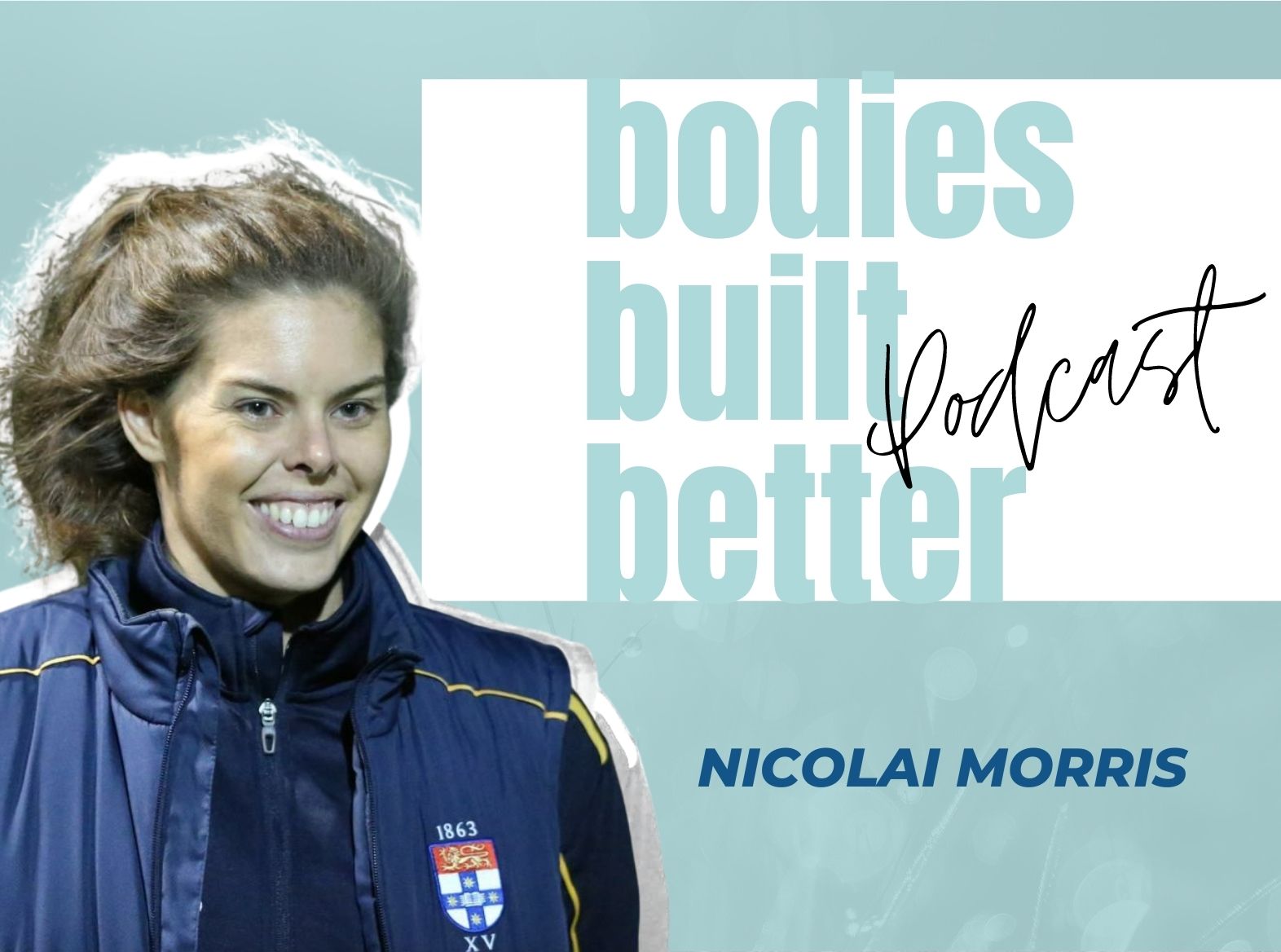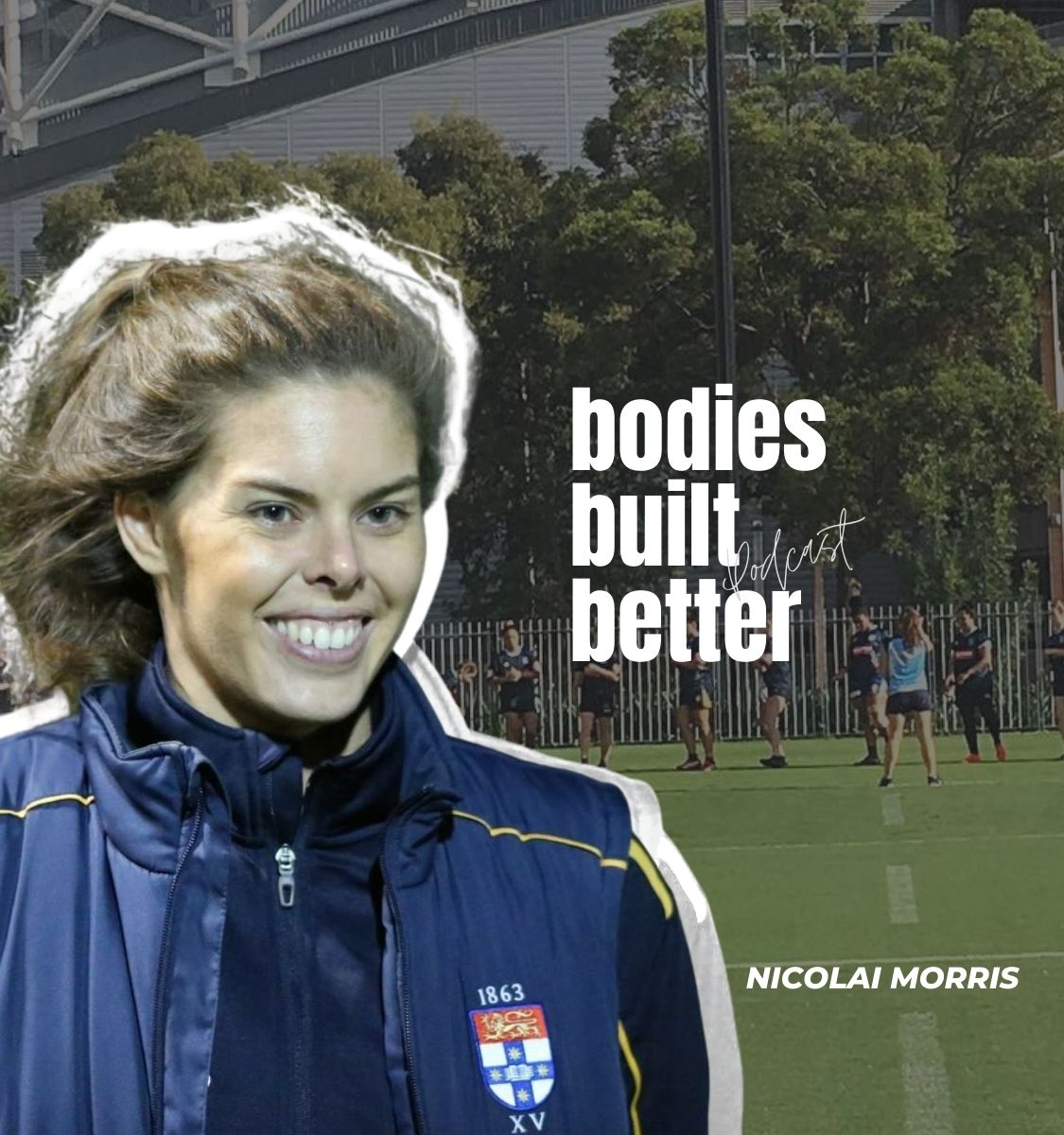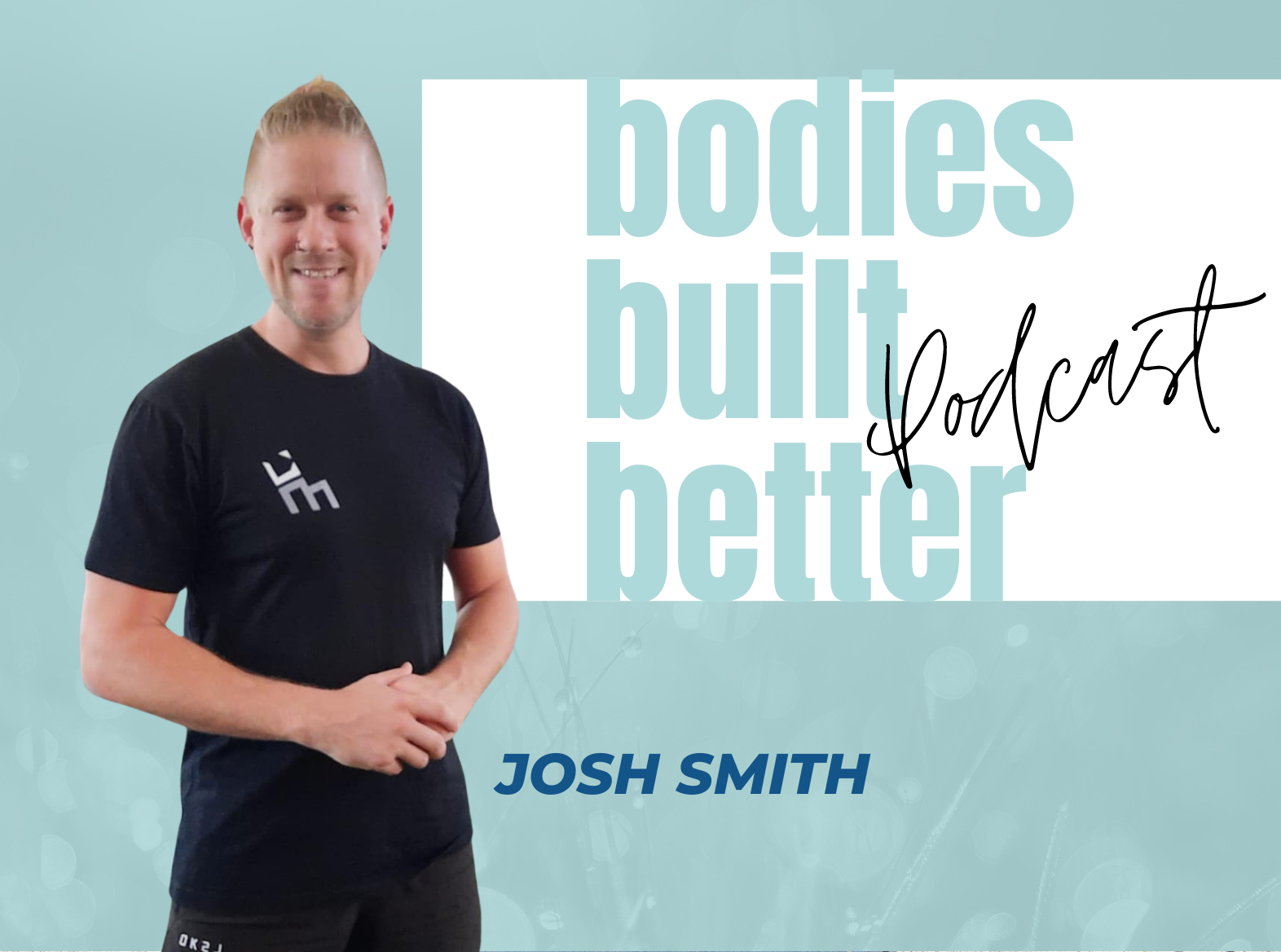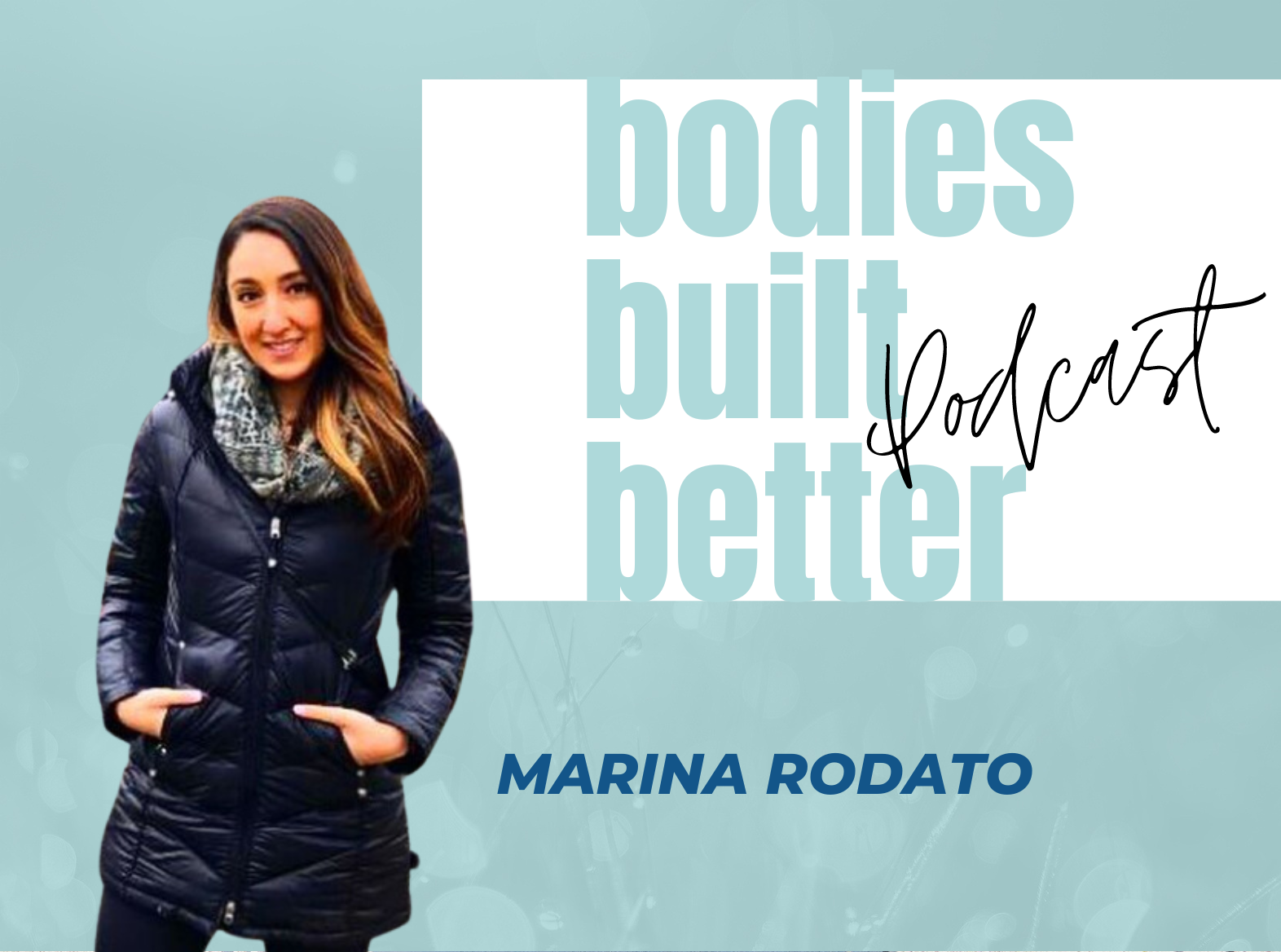How Nic Grinded Leading Up To The Olympics
Jackie 3:38
Nicolai, thank you so much for chatting with me today pumped to have you on now. Your friends call you Nic, so you are all good there. From the outside looking in, it seems like you’ve had such a massive year. You’re the strength and conditioning coach, or you were the strength and conditioning coach for the women’s hockey team. They made it to the quarterfinals. You’ve worked with Nicola McDermott, she’s had a phenomenal year. Coming off the Olympics, you’re in New Zealand, you meant to be in Australia. How are you even feeling, when you look back over this year so far?
Nicolai Morris 4:22
It kind of feels almost timeless. I think COVID does that too as well. It feels like it’s gone forever. But it’s been just a second at the same time. […] We’re not in a normal time zone to be honest. No, it’s been good. The first six months leading up to the Olympics was full on, like, just working so, so much and like even when you’re at home, you’re not really relaxing because there’s so many things you’re trying to think of and because I came into the role of the Black Sticks, just a year before the Olympics, trying to almost restart their their S&C programme from the ground up and trying to get everything going with so many new stuff, and you never really let yourself relax so much. So it’s been quite nice, even though I’ve started a new role and all the challenges of trying to move since post Olympics, it’s been nice not to have that almost time pressure stress of, “it’s got to be ready and done right about the games.”
Jackie 5:32
Yeah, you’re kind of forced to just chill for the time being, so to speak. Is it still working?
Nicolai 5:39
Yeah, well, I mean, the outside hours, it’s not like we can do much socially when you’re in lockdown. So it’s, that’s probably commonly a good time of being able to do a bit more chilling.
Beginning Of Swimming Revolution Of Nicolai Morris
Jackie 5:50
Yeah, nice fun. Well, I know I know you’re a swimmer growing up. So let’s start there. You know, how’d you get into swimming and, and the progress and evolution from there.
Nicolai 6:06
So I grew up most of my life in Queensland, so it was almost just a natural evolution of (how) everyone in Queensland swims. There’s a reason so many swimmers come from Queensland, the climate’s just perfect for it. But I was also quite a severe asthmatic. So I was in and out of hospital all my childhood, couldn’t run 800 metres without an attack till I was about 12 years old when I first started swimming all year round. So yeah, so the first year I swam all through winter and swam properly. It was the first year my lungs kind of started doing a normal person’s job.
And I was able to run and move and not die, trying to breathe. So swimming, not only did I just love it, I love the meditation of it, and the fact it’s a focus on trying to progress yourself and your times, and there’s so many little goals you can have. And I was really lucky to grow up in a great little suburbia community, in the inner west of Brisbane, but we had just such a lovely club, and the people were all fantastic. And I just like swimming clubs and swimming sessions. It was just such a joyful place to be. So I loved it so much that no matter what, even if I wasn’t improving or doing well, I just wanted to be there. And then the meditative kind of feeling you get from swimming, where the world kind of goes away and you just kind of alone with your thoughts.
And even now, I think it’s one of the best things because you can’t be connected to the outside world when you’re in the water. You can’t have your phone on, you can’t be answering emails and talking to people. That’s just you and your thoughts. And it’s a good way to kind of sift through your brain and have that reflection period. Although, as a child, it probably wasn’t so much that as thinking about what my next meal was going to be. But yeah, that’s where my kind of swimming evolution started.
Jackie 8:13
Were you trying to be competitive at a young age?
Nicolai 8:18
Yeah, from about, I’m probably about 10 or 11 I decided I really liked it. I was super untalented by everyone. No, no, no, no, no, seriously. People who knew me at that age would agree I loved it. But I was careful. I tried my heart out, but I was not very talented. And I know a lot of people say that, and a lot of good athletes say that. But mine was genuine. I was not winning races. As a junior I was pretty bad.
But then I was kind of picked from my squad by the seniors, the senior squad coach, because I worked my arse off. I didn’t miss training sessions. I was a really, really committed trainer. So he picked me out to come join the senior squad and that’s when I started training 11 times a week from about age 11 or 12 like a crazy swimmer did back in those days. And yeah, that really improved me at the time.
But because I was competing again, there were multiple Olympic gold medalists and Olympic representatives in my age group in Brisbane, not even just in Brisbane, just in my age group in local Brisbane. So yeah, there was a lot of like I was getting smashed by them. Oh, yeah, it’s like age. The girls and the girls who are winning at 10 years old with the same girls who made the Olympics like some of the girls who are also doing well at that age dropped out or left the sport but some of those girls didn’t. And they represented, it’s just, it’s a mecca for swimming, Brisbane, I would say, at least per capita, it would be the strongest swimming place in the world.
Sports Success: Combining Talent, Work Ethic & Passion
Jackie 10:15
It’s just, I mean, 11 times a week and for how long is each session?
Nicolai 10:21
Two to two and a half hours. It was unnecessary, it is super unnecessary to be doing that. And […] that’s what it was like, back then. It was you trained really hard, you trained really long and that’s how you got better. Whereas sport science and the progression of coaching has gotten so much better. It’s not like I’m just gonna do what I used to do, it’s actually looking at the physiology and what actually you need to do. Now I was a 50 metre swimmer. So I raced for 30 odd seconds or less in all my events. So that was really no reason to be training 6k. So, yeah, or 11 times like I was perpetually overtrained and sick. And I definitely didn’t get the best out of what I probably could have at that age. And I missed out on a lot of other sports and other things.
But at the time, that was my choice, and I absolutely loved it. But looking back, I would really have liked someone to teach me a little bit more or at least know a bit more about overtraining. And like, if I look back, there was no reason to train more than six times a week. No, no reason whatsoever. And there’s a few great swimmers, I think it’s Kaylee McEwen who won the 200 back in Tokyo. And her coach talked about the fact, I think it was her, could have been one of the other young swimmers like Ariane Tipnis, but I’m pretty sure it was Kaylee. And they didn’t swim her 1000 times a week during high school.
Her coach slowly progressed and once she finished school, she was up to the normal squad 10 times a week or whatever it was, she didn’t overload herself. And that gave her room to grow and move and progress. Whereas if you’re training like an elite athlete at 12 years old, it brings your ceiling down and plateaus you really really early on.
Jackie 12:26
Wow. Yeah, that’s good, fun. Well, before you said you knew you weren’t talented. It’s not that at all. I mean, you’re overtrained.
Nicolai 12:38
Oh no, I also wasn’t talented. I definitely wasn’t talented I yeah, I just loved it and focused on it and loved the movement and watching and how to get better. And I guess that’s kind of what drew me into coaching. From a younger age, I was watching how the better girls like there were girls who would train twice a week and flog me.
Talent is, unfortunately, with individual sports, they say that you can get by with work ethic […] you need a level of talent to be very good. You can do that in team sports, you can outwork people and get selected and make teams but in a sport like swimming to be elite you need both. But you can still be good without having done that much like you’ve got the genetics for it. And as a five foot, I’d like to say five, but probably five foot four small human, and the genetics for swimming, were definitely not there. But again, I loved it. And I still do and I still like competing with Masters. And it’s just a fun sport to be around. And I mean, when you’re swimming with and have club members who are nearing or in their hundreds, like, you realise that sport doesn’t end as a 18 year old, 16 year old, 20 year old, you can do sport forever, rather than just having that mindset of, “Oh, I’m done at this age. This is where I’m going to be good enough.” The Masters community’s awesome like that it gives you a complete perspective on what you can achieve at any age, which is great.
Where To Find Nicolai
Instagram: @nicolai_morris
Instagram: @womeninsport__
Sponsor:
Heavily Meditated is your down-to-earth meditation app for getting high on life.


